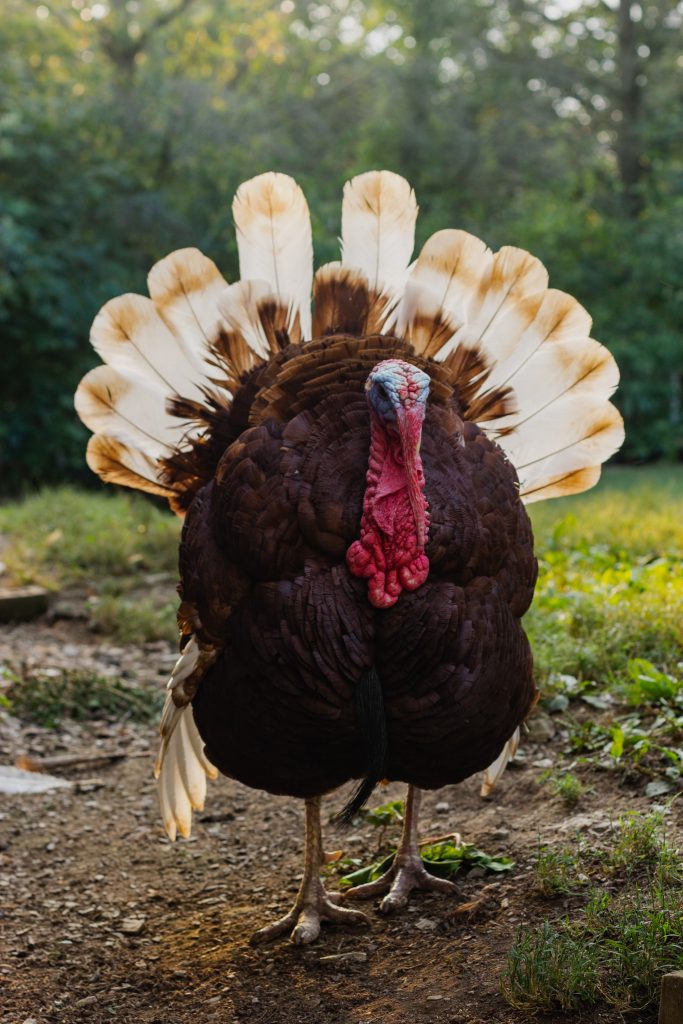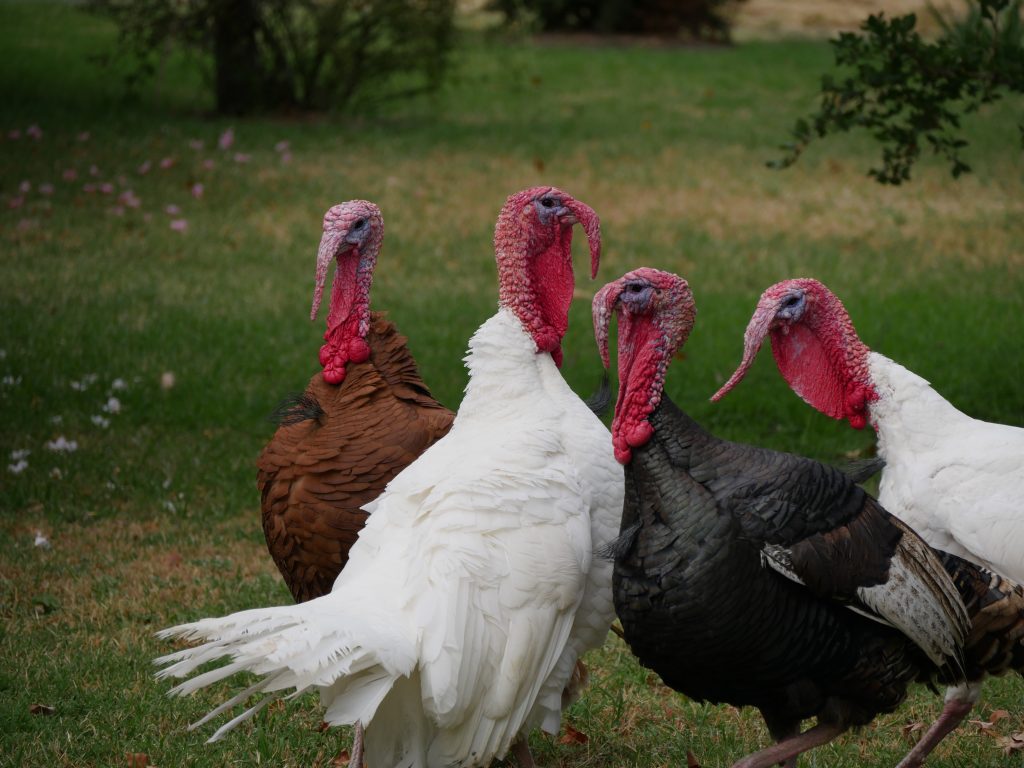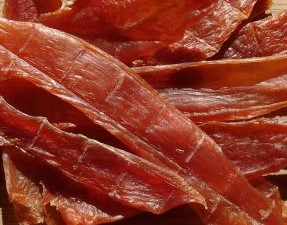Turkey, chicken, and even duck can all be made into jerky. The turkey jerky recipes can all be used for chicken. Use your judgment for the duck, as it has its own unique flavor. I will have more information on duck and fowl jerky in the future.
In the meantime, try one of the recipes below and be sure to see the two pages on the unique characteristics of poultry versus red meat listed below.


Turkey Jerky Recipes Below
Smoked Turkey Jerky
- 1/2 cup Soy sauce (can use light)
- 1/4 cup Sugar
- 2 tsp Fresh ginger grated
- 1 Clove garlic minced
- 1 TB liquid smoke
- 2 lbs. Cooked Turkey sliced paper thin (turkey thighs and breasts are best)
Mix marinade ingredients together in a bowl. Dip meat slices into marinade.
Place dipped meat in layers in a bowl or dish. Pour the remaining marinade sauce over the meat.
Cover tightly and let marinate in refrigerator for 6 to 12 hours. Rotate layers of meat occasionally.
Place in dehydrator until dry. While meat is drying, blot excess oil with a paper towel.
Since you are using cooked turkey, the drying time will be less. Follow the instructions for your dehydrator, or if using an oven, dry at 140 to 170 degrees F.
Lemon Ginger Turkey Jerky
- 1 1/2 lbs. Raw turkey – preferably breast
- 1/4 cup Soy sauce
- 1 TB fresh lemon juice
- 1/4 tsp garlic powder
- 1/4 tsp Black Pepper
- 1/8 tsp Ginger
Slice turkey across the grain in strips 1/8 to 1/4 inch thick (for easier cutting, freeze meat and thaw enough to slice easily).
Mix together the remaining ingredients and pour over the turkey. Distribute marinade well through the turkey.
Place turkey strips on dehydrator trays in a single layer, leaving space between pieces.
Dry about 5 hours or overnight.
Teriyaki Turkey Jerky
- 1 lb. Boned, skinned turkey breast or turkey tenderloin trimmed of all fat and connective tissue.
- 1/4 tsp Onion powder
- 1/4 tsp Garlic powder
- 1/2 cup water
- 1/4 cup Reduced-sodium soy sauce
- 2 tsps Worcestershire
- 2 TB Firmly packed brown sugar
- 1 tsp Pepper
- 1/2 tsp Liquid smoke
- Vegetable cooking spray
Freeze turkey until firm but not hard; then cut into 1/8- to 1/4-inch-thick slices.
Combine onion powder, garlic powder, water, soy sauce, Worcestershire, sugar, pepper, and liquid smoke in a medium-size glass, stoneware, plastic, or stainless-steel bowl. Stir to dissolve seasonings.
Add turkey and mix until all surfaces are thoroughly coated. Cover tightly and refrigerate for at least 6 hours or until the next day, stirring occasionally; recover tightly after stirring.
Drying the jerky: Depending on the drying method you’re using, evenly coat dehydrator racks or metal racks with cooking spray; if oven drying, place racks over rimmed baking pans. Lift the turkey from the bowl, shaking off any excess liquid. Arrange strips close together, but not overlapping, on racks.
Dehydrator drying: Arrange trays according to the manufacturer’s directions and dry at 140 degrees until a piece of jerky cracks and breaks when bent (4-1/2 to 6 hours; let the jerky cool for 5 minutes before testing).
Oven drying: Set oven to 140 to 200 degrees (the lower, the better – the lowest your oven allows). Place racks at least 4 inches away from (above or below) the heat source. Prop the oven door open by about 2 inches.
Dry until a piece of jerky cracks and breaks when bent (4 to 6 hours; let jerky cool for 5 minutes before testing). Pat off any beads of oil from jerky. Let jerky cool completely on racks; remove from racks, place in a rigid freezer container, and freeze for 72 hours. Then, store in airtight, insect-proof containers in a cool, dry place, or freeze or refrigerate.
Storage time: Up to 3 weeks at room temperature; up to 4 months in refrigerator; up to 8 months in freezer.
Turkey Jerky
- 1 lb. Turkey breast or tenderloins boned and skinned
- 1 TB Salt
- 1/2 cup Water
- 2 TBs Brown sugar; firmly packed
- 2 cloves of Garlic; pressed or minced OR 1/4 tsp Garlic powder
- 1/2 small Onion; minced OR 1/4 tsp Onion powder
- 1 tsp Pepper
- 1/2 tsp Liquid smoke
- Nonstick cooking spray

Rinse meat and pat dry. Pull off and discard any fat and connective tissue. To make meat easier to slice, freeze it until it feels firm, but not hard.
Cut turkey into 1/8 to 1/4-inch-thick slices. Cut breast with or across the grain, and tenderloins lengthwise.
In a bowl, stir together salt, water, brown sugar, garlic, onion, pepper, and liquid smoke.
Add turkey and mix well. Cover and chill for at least 1 hour or up to 24 hours; meat will absorb most of the liquid.
Depending on the drying method, evenly coat dehydrator racks with cooking spray or oil, (you’ll need 3 racks, each about 10 by 13 in.) or metal racks (to cover a 10- by 15-inch baking pan) with nonstick cooking spray.
Lift turkey strips from liquid, shaking off excess, and lay strips close together, but not overlapping, on racks.
In a dehydrator: Arrange trays as the manufacturer directs and dry at 140 until a cool piece of jerky (remove from the dehydrator and let stand about 5 minutes) cracks and breaks when bent, about 4 1/2 to 5 hours.
In an oven: Set at 150-200, place the pan on the center rack; prop the door open about 2 inches. Dry until a piece of jerky cracks and breaks when bent (see above), about 3-5 hours.
Let jerky cool on racks, then remove.
Serve or store in airtight containers in a cool, dry place for up to 3 weeks, in the refrigerator for up to 4 months, or longer in the freezer. Makes about 7 ounces.
Additional Information For You
Ingredients For Jerky – This shows how different ingredients will affect the poultry.
Beef vs Poultry – check out the important differences between the two when making jerky.
